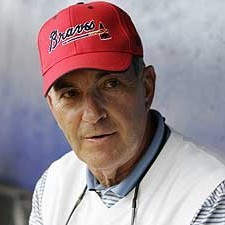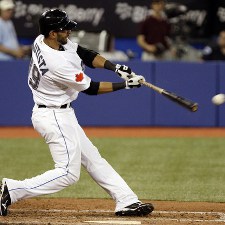A JOCKETTY JEER FOR CARDINALS
Sunday, September 26th, 2010Walt Jocketty has too much class, is too much of a gentleman to thumb his nose, stick out his tongue and say to the St. Louis Cardinals and their principal owner, Bill DeWitt Jr., “na na na na na.” So I’ll do it for him: Na na na na na.
Dewitt deserves this rude treatment because three years ago, only a year after his Jocketty-built team won the World Series, he fired Jocketty. Now Jocketty’s new team, Cincinnati, is on the brink of dethroning the Cardinals as National League Central champions.
“Personally it would give me great satisfaction should we do that,” Jocketty said. “But I still have a lot of good friends over there whether it’s on the field or guys I worked closely with. But I’d be lying if I said it didn’t give me good feelings. You get some doubts after a while and this shows there was no reason for that to happen.”
During Jocketty’s and DeWitt’s 12-year association in St. Louis, the Cardinals won six division titles, tied for first another time and played in another World Series besides the one they won. They finished in or tied for first six times in a seven-year span, and a year after that stretch Jocketty was fired.
DeWitt did not return a telephone call to discuss his decision to fire Jocketty, who said “not really” when I asked him if he understood why he was fired.
“It was philosophy, the direction they wanted to take the organization, how they put their team together,” Jocketty said. “I didn’t necessarily go along with the thinking. We had a pretty good organization in place. I was given the right to run the organization the way I thought it should be, and I think people would say we had done the right job in scouting and player development and had the right people, quality people, to run it.”
Jocketty was probably the most notable victim of the modern-day baseball war between evaluation and analysis. It mattered not to DeWitt that Jocketty’s belief in player evaluation had worked extremely well for the Cardinals. The owner was seduced by others in the organization into believing that statistical analysis was the way to go.
That was the method created by Bill James and was featured in the Michael Lewis book “Moneyball,” which ridiculed one Oakland scout not for his inability to judge players but for the fact that he was fat.
However, John Schuerholz, architect of the Atlanta Braves’ unparalleled 14-year run in first place, criticized the “Moneyball” concept in his 2006 book, “Built to Win.”
“As portrayed in that book,” Schuerholz wrote, “it is a bogus concept because I know you can’t make baseball judgments entirely on statistical analysis to build a team.”
Nevertheless, younger members of front offices have espoused analysis over evaluation, and the Cardinals were one of the places they succeeded in gaining a foothold, much to Jocketty’s dismay.
Jocketty, however, was not unemployed for long. Bob Castellini, the head of the Reds’ ownership group, had been a minority partner in DeWitt’s ownership of the Cardinals, knew Jocketty well and hired him as a special adviser three months after he left the Cardinals.
“He called me the day after I was fired,” Jocketty said in a telephone interview last Friday evening, when the Reds’ division-clinching number was three. “I wasn’t ready to go to work yet. I went there in the middle of January.”
Jocketty was in his new job for less than four months when Castellini made him general manager, firing another good man, Wayne Krivsky, in the process.
The Reds would suffer their eighth consecutive losing season that year, then their ninth last year. Meanwhile, Jocketty was working to turn things around.
With Castellini having come from the Cardinals, Jocketty said, “it was important for him that we be able to turn it around quickly.”
Easier said than done, but Jocketty has done it quickly. A critical factor in his effort has been the addition of three men who worked for him in St. Louis – Jerry Walker, Cam Bonifay and Mike Squires. These scouts and scouting executives know how to use calculators and computers, but more important, they use their eyes and can evaluate what they see.
Has Jocketty made any changes in his method of operation since becoming the Reds’ general manager? “No, not really,” he said but acknowledged that “you have to use a certain amount of statistics.”
 Jocketty didn’t need statistics to make what he called his “single most important acquisition,” the deal at the trading deadline last year that brought the Reds Scott Rolen, Jocketty’s third baseman in St. Louis.
Jocketty didn’t need statistics to make what he called his “single most important acquisition,” the deal at the trading deadline last year that brought the Reds Scott Rolen, Jocketty’s third baseman in St. Louis.
“It’s not just what he does for us on the field offensively and defensively,” Jocketty said, “but what he does for the other players. He’s a role model for the younger guys, and he sets the tone for how we play.”
The Reds struggled in the first month of the season, not getting above .500 to stay until May 4. The Cardinals, meanwhile, won two-thirds of their first 27 games in the same period.
Two weeks later, though, Dusty Baker had his team in first place for the first time, and the teams leapfrogged each other into the division lead until Aug. 15, when the Reds took over and have been there since.
The Reds are there because they have the best offense in the league and just about the best defense as well. They have also had interesting developments with their pitching.
While the Washington Nationals kept their pitching prodigy, Stephen Strasburg, in the minors for the first two months of the season because, they said, he had had no professional experience, the Reds put Mike Leake in their starting rotation from the start of the season despite his lack of professional experience.
The right-handed rookie responded with an 8-4 record in 22 starts before he was shut down Aug. 24. By then Jocketty had promoted another rookie pitcher, Travis Wood, who has a 5-4 record in 15 starts.
But Jocketty saved his pitching piece de resistance for last, summoning Aroldis Chapman Aug. 31. Earlier in the year Chapman, a Cuban defector, was a highly sought left-handed pitcher, the kind that usually costs a lot of money and the Reds shy away from.
But Jocketty liked what he heard from his scouts and convinced Castellini he was worth the $30.25 million the Reds gave him.
“We signed him as a starter and we feel that’s his future,” the general manager said, “but at mid-season we converted him into a reliever because we thought that’s how he could best help us this year.”
In his first seven relief appearances, the 22-year-old Cuban was virtually unhittable, throwing pitches that regularly exceeded 100 miles an hour. But major league hitters demonstrated that speed doesn’t always kill. Chapman was the losing pitcher in two of his next four outings.
The night before his second loss Chapman threw 25 pitches, every one 100 or faster. One reached 105 and three 104.
Chapman may have to work on getting more movement on his pitches, but Jocketty expects him to be an important part of the Reds’ future as well as their post-season present.
Asked if he had reason to believe before the season that the Reds had a chance to make the playoffs, Jocketty said, “We tried to tell the players in spring training we thought we had a team that had an opportunity to win but it was up to them to carry it through. I told them I thought we had a team that would be in contention and would be for some years to come.”
Bill DeWitt has to wonder if the Cardinals will be there with them.
PHILS’ COLUMN THAT WASN’T
For a couple of months I had an idea for a column I wanted to write but never got to it, and I regret not having written it. As far back as the third or fourth week of July, even when the Philadelphia Phillies were struggling, I felt certain that they would repeat as division champions. But I didn’t write it then, and I never wrote it. They beat me to it.
The Phillies, who have been in the World Series the past two years, are an impressive bunch, and Charlie Manuel is an impressive manager.
The Phillies were seven games from first July 22, cut that deficit in a week and were only a game behind Atlanta Aug. 6. It took another month for the Phillies to supplant the Braves at the top of the National League East, but as far as I was concerned, there was never any doubt that they would.
Once they did, they took off on a sprint to the finish line, winning 11 in a row at one stretch, including a three-game sweep that buried the Braves.
They have done a lot of this, staying in the race as well as winning it, despite injuries to many of their best players.
Shortstop Jimmy Rollins has been plagued by leg ailments all season, spending extended time on the disabled list twice, playing all of only two months (July and August), playing only 82 of the team’s 155 games (through Saturday) and, most recently, playing no games since Sept. 8. His status for the post-season is uncertain.
Second baseman Chase Utley missed 46 games, thanks to a sprained thumb ligament. Catcher Carlos Ruiz missed nearly three weeks with a concussion. In one part of August, Utley, center fielder Shane Victorino and first baseman Ryan Howard were on the disabled list together.
Members of the pitching staff have also served time on the disabled list, including starters Jamie Moyer and Joe Blanton and relievers Brad Lidge, J.C. Romero and Ryan Madson.
Yet the Phillies will be there when the playoff bell rings next week.
THE SIGHS HAVE IT
 Only one week remains for contenders to state their cases for the Sigh Young award. The field is crowded.
Only one week remains for contenders to state their cases for the Sigh Young award. The field is crowded.
Kevin Millwood of Baltimore appears to be the front-runner, leading the majors in losses with his 3-16 record plus a 5.29 earned run average that helps his case.
These pitchers are his primary contenders:
- David Huff, Cleveland, and Charlie Morton, Pittsburgh, each 2-11, Huff with a 6.21 e.r.a., Morton 8.11
- Ryan Rowland-Smith, Seattle, 1-10, 6.90
- Kenshin Kawakami, Atlanta, 1-10, 9.15
- Felipe Paulino, Houston, 1-9, 4.84
- Jason Marquis, Washington, 2-9, 7.18
- Ross Ohlendorf of Pittsburgh has a 1-11 record, but he basically disqualifies himself with a 4.07 e.r.a.

 Brian Sabean, the Giants’ general manager, certainly cares about his team’s fate in the races, but he didn’t care enough to fortify the team with Posey prior to May 29. Maybe he figured then that it wouldn’t matter now, that his team wasn’t good enough to contend for a playoff spot. But surprise, here it is.
Brian Sabean, the Giants’ general manager, certainly cares about his team’s fate in the races, but he didn’t care enough to fortify the team with Posey prior to May 29. Maybe he figured then that it wouldn’t matter now, that his team wasn’t good enough to contend for a playoff spot. But surprise, here it is.
 How did Schuerholz wind up in Atlanta when he had signed a lifetime contract with the Royals and the new 50 percent owner of the team, Avron Fogelman?
How did Schuerholz wind up in Atlanta when he had signed a lifetime contract with the Royals and the new 50 percent owner of the team, Avron Fogelman? the 26th major league player to hit 50 in a season. If this were a few years earlier, skeptics would be suggesting his possible use of steroids or other performance-enhancing drugs, but the Toronto outfielder has not come under suspicion as some others have.
the 26th major league player to hit 50 in a season. If this were a few years earlier, skeptics would be suggesting his possible use of steroids or other performance-enhancing drugs, but the Toronto outfielder has not come under suspicion as some others have. His teammate is undermining Carlos Gonzalez’s chances of winning the National League most valuable player award. Gonzalez has been having a productive and most valuable season for Colorado, but now Troy Tulowitzki comes along and seems intent on carrying the Rockies on his bat right into the playoffs.
His teammate is undermining Carlos Gonzalez’s chances of winning the National League most valuable player award. Gonzalez has been having a productive and most valuable season for Colorado, but now Troy Tulowitzki comes along and seems intent on carrying the Rockies on his bat right into the playoffs.